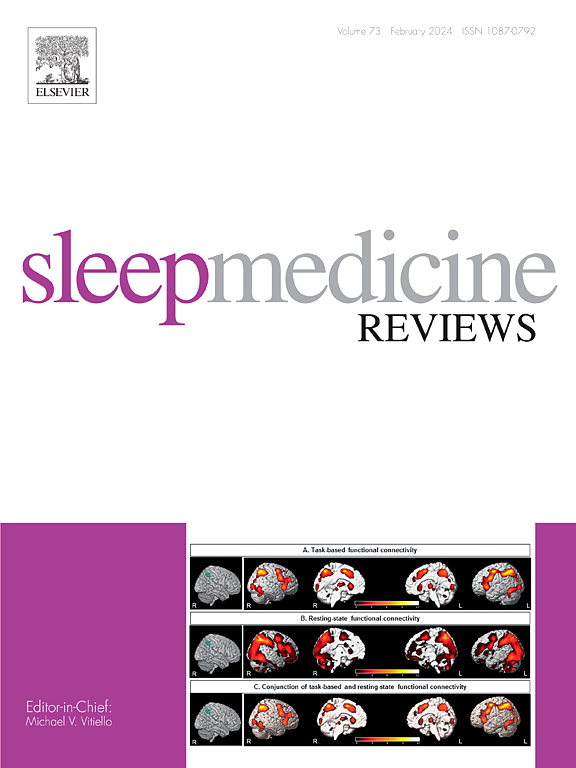Sleep and the Mediterranean diet: A systematic review and meta-analysis
IF 9.7
1区 医学
Q1 CLINICAL NEUROLOGY
引用次数: 0
Abstract
We conducted the current systematic review and meta-analysis to critically review and synthesize available evidence regarding the association between sleep duration, sleep quality, and chronotype with the Mediterranean diet (MedDiet) among the general population using observational studies. Online databases, including PubMed, Scopus, and ISI Web of Science, were searched from the earliest available date until December 2024. We enrolled 62 studies with a total sample size of 328,493. The mean age and BMI of the participants in the enrolled studies ranged from 6.1 to 74.7 years and 18.1–32.1 kg/m2. Individuals with sufficient sleep duration (OR: 1.39; 95 % CI, 1.04, 1.85; P = 0.030; I2 = 97.89 %, PQ-test < 0.001), good-quality sleep (OR: 1.38; 95 % CI, 1.10, 1.73; P < 0.001; I2 = 93.83 %, PQ-test < 0.001), and earlier chronotype (OR: 1.93; 95 % CI, 1.26, 2.95; P = 0.002; I2 = 89.92 %, PQ-test < 0.001) had significantly increased odds of high MedDiet scores, compared to those with insufficient sleep duration, poor-quality sleep, and later chronotype, respectively. Our study revealed that sleep duration, sleep quality, and chronotype are lifestyle-related factors linked to MedDiet. However, more longitudinal studies and clinical trials are needed to investigate causality, mediating factors, and underlying mechanisms.
睡眠与地中海饮食:一项系统回顾和荟萃分析
我们进行了当前的系统综述和荟萃分析,通过观察性研究,对普通人群中睡眠时间、睡眠质量和睡眠类型与地中海饮食(MedDiet)之间的关系进行了批判性回顾和综合现有证据。在线数据库,包括PubMed, Scopus和ISI Web of Science,从最早的可用日期到2024年12月进行了搜索。我们纳入了62项研究,总样本量为328,493。入组研究参与者的平均年龄和BMI为6.1 - 74.7岁,18.1-32.1 kg/m2。睡眠时间充足的个体(OR: 1.39;95% ci, 1.04, 1.85;p = 0.030;I2 = 97.89%, PQ-test <;0.001),高质量睡眠(OR: 1.38;95% ci, 1.10, 1.73;P & lt;0.001;I2 = 93.83%, PQ-test <;0.001),更早的时型(OR: 1.93;95% ci, 1.26, 2.95;p = 0.002;I2 = 89.92%, PQ-test <;0.001)与睡眠时间不足、睡眠质量差和睡眠类型较晚的人相比,MedDiet得分高的几率显著增加。我们的研究表明,睡眠时间、睡眠质量和睡眠类型是与MedDiet相关的生活方式相关因素。然而,需要更多的纵向研究和临床试验来调查因果关系、中介因素和潜在机制。
本文章由计算机程序翻译,如有差异,请以英文原文为准。
求助全文
约1分钟内获得全文
求助全文
来源期刊

Sleep Medicine Reviews
医学-临床神经学
CiteScore
20.10
自引率
3.80%
发文量
107
期刊介绍:
Sleep Medicine Reviews offers global coverage of sleep disorders, exploring their origins, diagnosis, treatment, and implications for related conditions at both individual and public health levels.
Articles comprehensively review clinical information from peer-reviewed journals across various disciplines in sleep medicine, encompassing pulmonology, psychiatry, psychology, physiology, otolaryngology, pediatrics, geriatrics, cardiology, dentistry, nursing, neurology, and general medicine.
The journal features narrative reviews, systematic reviews, and editorials addressing areas of controversy, debate, and future research within the field.
 求助内容:
求助内容: 应助结果提醒方式:
应助结果提醒方式:


